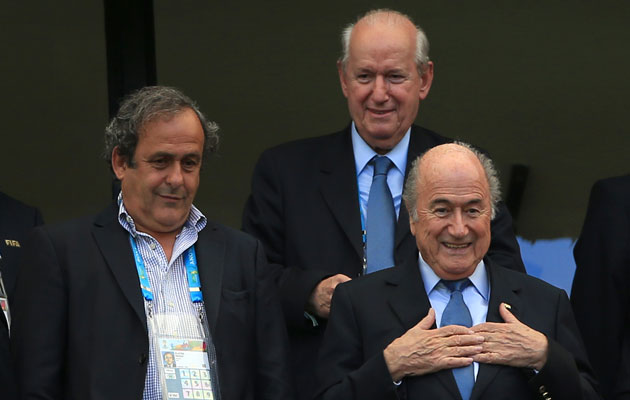Sepp Blatter and Michel Platini have been sensationally suspended from all activity in football for the next eight years.
Inevitably, the 79-year-old Swiss administrator and 60-year-old Frenchman will not accept the verdicts and sentences delivered today by German judge Hans-Joachim Eckert, chairman of the adjudicatory chamber of the ethics committee of world federation FIFA.
They will go first to the FIFA appeal committee and then to the Court of Arbitration for Sport. Ideally Blatter wants to clear his name in time to preside over the extraordinary elective congress which will pick his successor in Zurich on February 26; Platini wants to be back in that election race.
Realistically the practical prospect of the sports legal wheels grinding that fast are minimal; several previous ‘recipients’ of ethics verdicts are still complaining that they have yet to see the written reasonings on which to base an appeal.
Technically therir downfall was brought about by misconduct in office over Blatter’s approval of a SFr2m payment to Platini in April 2011 and the UEFA president’s acceptance of it.
The pair claimed it was to honour a verbal contract to pay Platini for work he had undertaken, perfectly properly, as Blatter’s ‘football counsellor’ at FIFA between 1999 and 2022.
But both the nine-year time lapse in payment, the notion of a million-franc verbal deal plus the conflict of interest issue between a FIFA president and one of his serving vice-presidents were all beyond implausible.

Increasingly delusional…Sepp Blatter faces the press after being handed an eight-year ban from football.
Blatter’s downfall, after his years of service to both football and FIFA, is a personal tragedy whose reality – judged by all his increasingly delusional interviews – appears to have drifted beyond his comprehension.
Above all, Blatter was his own worst enemy by insisting on clinging on to power. It was as if he believed he could keep Titanic afloat by personally rearranging the deckchairs while the ship was breaking up – split in two by the greed of too many of its senior officers.
Blatter may have been president of FIFA but he failed, fatally, to enforce the power of his position when demanded. Instead of calling to order Jack Warner (in CONCACAF), Mohamed bin Hammam (in Asia) and Nicolas Leoz (in South America) he turned a blind eye to their corrupt managements of their own fiefdoms . . . just as long as they responded with all the votes at their command when he needed them.
Easy, with hindsight, to say that Blatter should have risked confrontation – and possible defeat and overthrow – by confronting them. But he had been in FIFA ever since 1975 when he was its 11th employee, commissioned to lead and organise the game’s worldwide development. This was his life’s work; he could not contemplate anything which would separate him from what he considered his human destiny.
Aides used to only half-joke that Blatter, after rising to general secretary, was first in the door in the morning at FIFA House to open the post, and the last man remaining to turn out the lights at night.
He was well-paid: £5m-a-year according to old friend Christian Constantin. But the money was immaterial which made Blatter’s opposition to transparency on pay all the more perverse. FIFA, for him, was a 24/7 existence.
No wonder three wives came and went; Blatter has always been married to FIFA and football – because, for him, the two are indivisible. In the end, however, he moulded FIFA, and the way it worked, to suit his own end, the end of keeping him in power.






